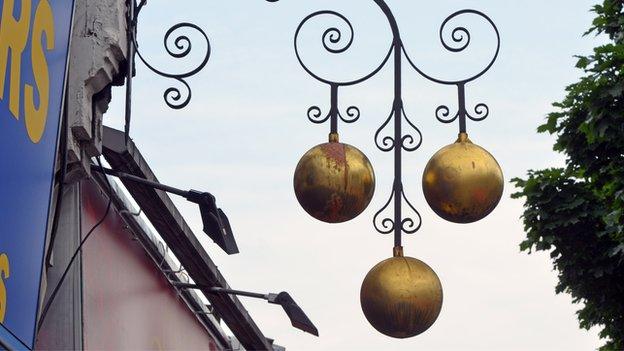UK living too high on the hog (again)
- Published
- comments

Pawnbroker Britain? The UK has a propensity to consume more than it can afford
It is on days like today that I am grumpy with the Office for National Statistics and with myself. Because I would love to usher in Christmas with some positive economic news (or perhaps none at all).
But, as you know, I have been slightly obsessed with the UK's very big current account deficit - the gap between the income paid to, and received from, the rest of the world.
And so I can't bring myself to ignore (curses) today's disclosure that the deficit widened again, to 6% of national income or gross domestic product (GDP), in the three months to the end of October.
That means the current account deficit has been well above 5% of GDP for 15 months, which is the worst it's been since records were first properly collected in the early 1950s.
Here are the quarterly numbers:
2013 Q3 - 6%
2013 Q4 - 5.6%
2014 Q1 - 5.1%
2014 Q2 - 5.5%
2014 Q3 - 6%.
Our inability to pay our way in the world matters, because it means we either have to ship in debt or sell our assets to the rest of the world on a large scale.
The big point is that, at a time when the UK's total debts (household, business, financial and government) are more-or-less at an all time high - around 500% of GDP on McKinsey's analysis - it is almost impossible to get the debt burden down when there's a large and negative current account deficit.
To be clear, the trends aren't all negative. The trade deficit narrowed very slightly, from £9.2bn in the second quarter of the year to £9bn.
And here it is important to remember, for all the talk of a welcome revival in manufacturing, that we would be completely sunk without our prowess in services.
There was a £22.86bn surplus on trade in services, up from £20.89bn. By painful and overwhelming contrast, the deficit in goods trade was a large £31.9bn, up from £30.11bn.
In fact the deficit on trade in goods has been increasing during all the months when our economy was supposed to be "rebalancing" towards manufacturing, whereas our surplus on services has (thankfully) been increasing.
Primary income
All that said, the big story of the big hole in the current account isn't about trade; it is caused by the collapse in what's called our "primary income", which is largely the balance between the income we receive on our investments abroad and what we pay out to foreign owners of investments in Britain.
Now, for as long as anyone could remember, we enjoyed a surplus on our primary income. But in the second quarter of 2012, our primary income balance went into deficit, and that deficit has become progressively worse.
So in the fourth quarter of 2011, the surplus on net income from investments was 0.7% of GDP.
But that went negative, to the tune of 0.2% of GDP, in the second quarter of 2012. And in the third quarter of 2014 the primary income balance was in deficit by 2.8% of GDP.
In other words, over three years there has been a dramatic negative swing from surplus to deficit of 3.5% of GDP in our primary income balance.
What on earth is going on?
Well the conventional explanation is that the flatlining eurozone has meant UK investments in the region have been yielding progressively worse returns.
Our overall current account deficit with the European Union was £28.5bn in the quarter, up from £27.9bn - and on this occasion the worsening was down to a lousier trade performance.
Now unless you think the eurozone is set for some kind of dramatic recovery - and you would be almost unique if you did think that - we are going to have grit our teeth and cope with these lousy returns for quite a while yet.
But what was perhaps a bit disturbing was that our primary income balance with countries outside the EU went into deficit of £2.3bn from a surplus of £2.4bn.
In other words, we don't appear to be able to generate a net profit on our investments anywhere in the world.
Ouch.
Can we repay our debts?
There is however a possible silver lining to our lamentable performance.
Which is that the latest figures show a big increase in the profits of foreign-owned UK companies, from £9.6bn to £12.9bn.
So perhaps we can fund our huge current deficit by continuing to sell what some see as our crown-jewel companies and assets to foreigners.
But we can't take that for granted.
At some point the indebtedness of the UK will reach a level where foreign investors will question our ability to repay it - especially if there is no conspicuous revival in UK productivity, or the efficiency of workers and businesses.
At that point, foreigners would not wish to hold sterling and the pound could plummet, in what used to be called (in the bad old days) a sterling crisis.
So although it is extremely fashionable, especially in the City, to ignore the UK's record current account deficit, it is the UK's Achilles Heel. And at some point we may rue what is in essence no more complicated than our propensity to consume more than we can afford.